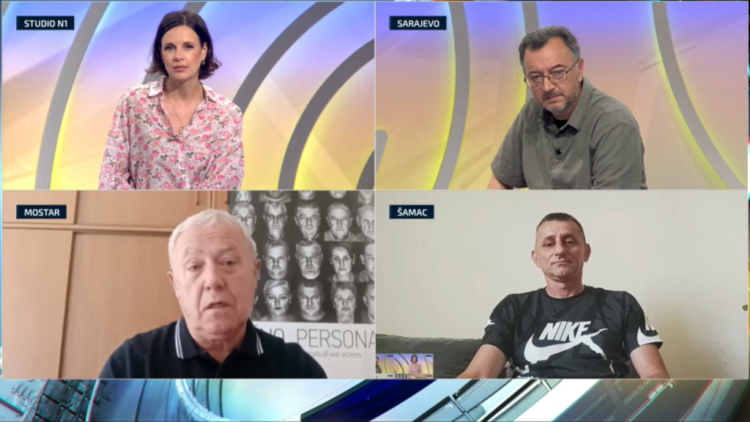
Sinisa Mijanic, a veteran of the Army of the Republika Srpska, Kreso Primorac, a veteran of the Croatian Defense Council, and Amer Delic, a veteran of the Army of the Republic of Bosnia and Herzegovina, have swapped their weapons for microphones and bullets for words. Now fighting for peace under the non-governmental organization Center for Nonviolent Action, these former enemies met on N1 show to share their message: all sides have victims deserving of respect, and the future must be built on peace and coexistence.
Sinisa Mijanic, speaking from Samac for N1, recounted his intertwined life and war story. At 18, he was conscripted for military service while planning a future with his girlfriend, who eventually fled to Germany during the conflicts. Mijanic highlighted the shocking reality of war, emphasizing that none had anticipated such a violent turn of events.
“Everything was arranged, but I went to serve in Banja Luka at the Reserve Officers School, and then to Knin and the battlefield,” he recalled.
“However, we maintained our relationship even during my injury until the conflicts started in Bosnia and the vicinity of Samac. I then learned from her family that she had left for Germany.”
Reflecting on the friends he found himself fighting against, Mijanic said, “No one even thought at that time that there could be a war because it was a normal time, we lived as if conflicts would never happen.”
Kreso Primorac, who was 34 when the war began, contrasted his perspective with that of younger soldiers, stressing the importance of maturity and understanding in preventing conflicts.
“The difference in understanding war between an 18-year-old and a 34-year-old should be evident because the older one is expected to be more mature,” he explained. “Now new generations are coming, and unfortunately, we see many calls and misunderstandings between ethnic groups, raising tensions. I have matured and understand what those messages mean, but I fear for the youth.”
Reflecting on the horrors of war, Primorac emphasized the pain of seeing fallen comrades. “That is always the hardest. It's also hard to be separated from family. I was in Mostar at the battlefield, while my family was in Split in exile.”
Amer Delic, caught in the war at 19, shared his experience of mental trauma and the difficulty of post-war adjustment. Through his involvement with the Center for Nonviolent Action, he has found healing and purpose in promoting dialogue and reconciliation.
“It is an accumulated experience, especially in such a time period when everything is brutal,” he explained. “Starting from the deaths of closest friends, family members, shortages of basic things like electricity and water necessary for normal living.”
He elaborated on the mental toll of the war, “I have only now become aware and understand the consequences it left on me. I believe that my cooperation with veterans through this Center for Nonviolent Action helped me a lot.”
Together, these veterans visit numerous sites of atrocities, advocating for the recognition of all victims and the pursuit of justice. They urge society to honor the past while fostering mutual respect and dialogue to prevent future conflicts. Their efforts highlight the enduring impact of war and the crucial role of reconciliation in building a peaceful future.
“In a way, I was driven by the desire that no one else goes through what we did or what I went through at just 18 years old,” Mijanic explained. “To try to educate others not to think about conflicts, to avoid them.”
Primorac added, “Simply because I realized that there are victims on all sides. I met Zijad Bacic, whose two brothers, sister, and mother were killed in the village of Zecovi, and he survived the shooting at 14.5 years old.”
Delic, discussing the emotional weight of visiting sites of atrocities, said, “Especially if you are at a site where your army committed a crime. You feel that unease. It is difficult at any site, whether it concerns victims from your nation or another. In the end, we see it universally. What motivates me is that we are always well received by the victims’ families, which means that people only need presence and honesty.”
Their commitment to peace and reconciliation demonstrates the possibility of healing even the deepest wounds through dialogue and mutual respect. Mijanic summed up their mission: “In these areas, war has brought nothing good to anyone; it has only taken something away from everyone.”
Through their work with the Center for Nonviolent Action, these veterans strive to ensure that the next generation can live in a Bosnia and Herzegovina defined by peace and unity, not conflict and division.





Kakvo je tvoje mišljenje o ovome?
Budi prvi koji će ostaviti komentar!